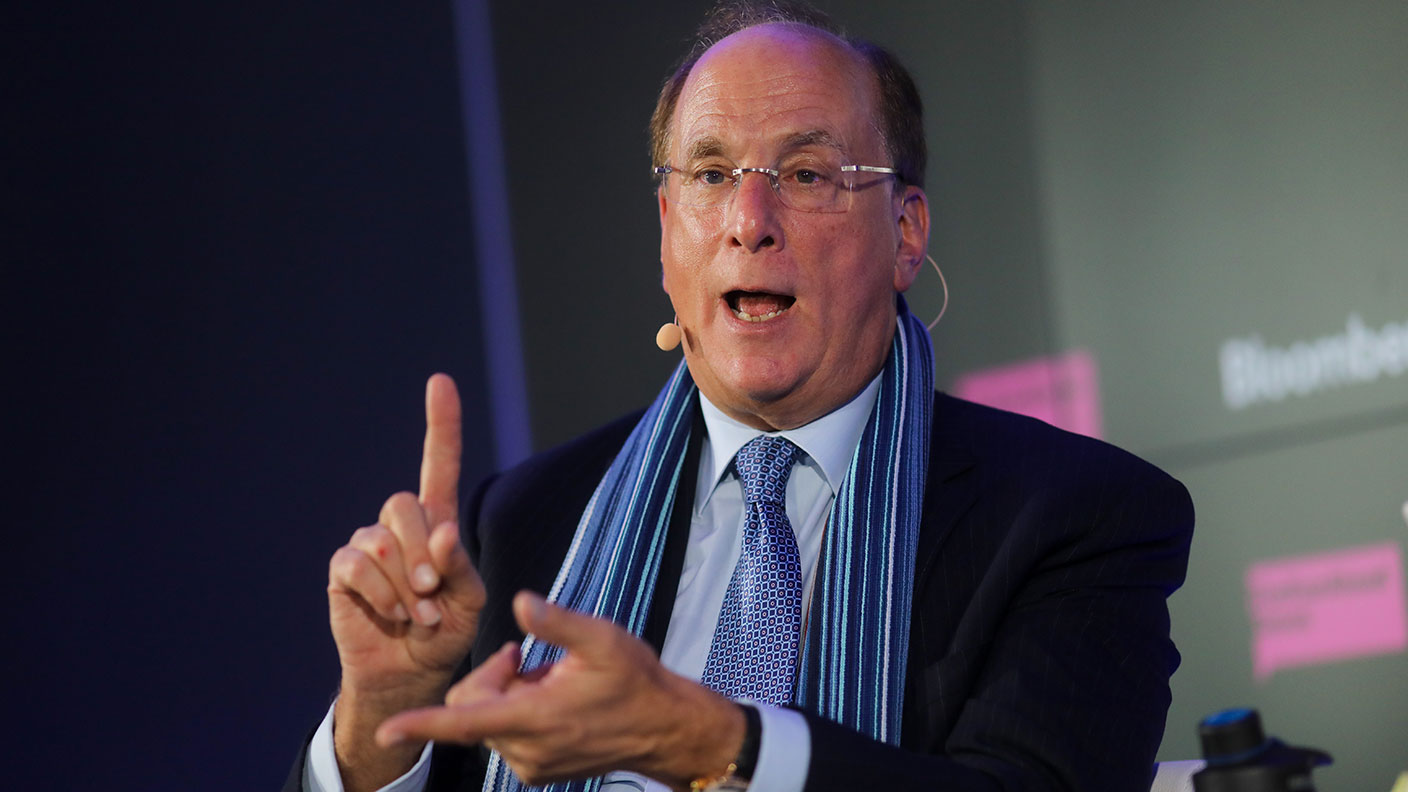The world’s most powerful asset manager wants you to have your say
Under shareholder capitalism, the owners of the companies the big fund managers invest in are us – yet our voice is rarely heard. Now one asset manager, Larry Fink of Blackrock, could be about to give us a say. Merryn Somerset Webb looks at what he's proposing.


Get the latest financial news, insights and expert analysis from our award-winning MoneyWeek team, to help you understand what really matters when it comes to your finances.
You are now subscribed
Your newsletter sign-up was successful
Want to add more newsletters?

Twice daily
MoneyWeek
Get the latest financial news, insights and expert analysis from our award-winning MoneyWeek team, to help you understand what really matters when it comes to your finances.

Four times a week
Look After My Bills
Sign up to our free money-saving newsletter, filled with the latest news and expert advice to help you find the best tips and deals for managing your bills. Start saving today!
The Power of Capitalism – that’s the title that Larry Fink, CEO of Blackrock, has given to his latest letter to the CEOs of the companies in which his firm invests.
Fink’s letters matter. Blackrock is the largest money management company in the world – the most recent numbers suggest that it has over $10trn under management.
That’s not just real money in absolute terms, but also the kind of money that gives him stunning power.
MoneyWeek
Subscribe to MoneyWeek today and get your first six magazine issues absolutely FREE

Sign up to Money Morning
Don't miss the latest investment and personal finances news, market analysis, plus money-saving tips with our free twice-daily newsletter
Don't miss the latest investment and personal finances news, market analysis, plus money-saving tips with our free twice-daily newsletter
The most powerful shareholders in the world
Along with Vanguard and State Street (the world’s other fund management giants), Blackrock controls some one third of all assets managed worldwide.
In the US, one of the big three is the top shareholder in 495 of the companies in the S&P 500. In the UK, Blackrock and Vanguard between them control over 10% of more than two-thirds of the 100 largest listed companies. Last year Blackrock was the number one shareholder in 41 of those firms.
I could go on – there are endless stats on this. But you get the idea: Fink controls a vast mountain of money invested in the world’s stockmarkets in such a way that, given how dispersed other shareholders are, gives him enough votes and enough clout to demand that an awful lot of companies do pretty much anything he fancies.
And, as he makes clear in his letters (which, by the way, aren’t really just for the CEOs – if they were, I’d get fewer press releases about them) he fancies quite a lot of stuff.
For the last few years it’s been CEOs being more into ESG (environmental, social and governance issues) – presumably because that is what Fink figured his clients were increasingly into. So we have had a good few letters explaining that the old way of running a listed company – making stuff or creating a service, selling it as efficiently as possible, and using the profits to the benefit of shareholders, is wrong, wrong, wrong.
Instead, said the world’s self appointed hectorer-in-chief, shareholder capitalism must give way to “stakeholder capitalism” and each company should also “show how it makes a positive contribution to society.”
You might say that the very act of creating a service or product that is in demand and legal is in itself proof of a positive contribution to society. Not so: companies must benefit “all their stakeholders including shareholders, employees, customers and the communities in which they operate”.
Note that “neutral” is not an option – there must be “benefit” (oh, and there must be net zero – in 2021, Fink announced that all companies should be net-zero carbon emitters by 2030). It’s all quite a lot for one unelected do-gooder to demand from pretty much every company in the world isn’t it? Less shareholder capitalism than money manager capitalism, perhaps.
A backlash is building
No surprise, then, that there’s a sense of a little backlash building. One example: last week JD Wetherspoon released a trading update. In it, the company noted that Blackrock (which holds some 3.5% of Wetherspoon shares) had voted against all Wetherspoon non-executive directors “for alleged shortfalls in corporate governance standards at our November AGM”.
Quite right, you might say. But I’m not so sure. Blackrock’s corporate governance executives had, said the update, never previously mentioned concerns and had given no warning of their voting intentions.
Worse, “Blackrock itself infringes UK corporate governance guidelines since its chairman is also CEO and it does not appear to observe the nine-year maximum tenure guideline for non-executive directors.” Glasshouses. Stones. Not easy living up to your own standards is it?
Still, Fink is nothing if not market aware. So this year’s letter contains some careful backtracking. Turns out that “stakeholder capitalism is not about politics. It is not a social or ideological agenda. It is not ‘woke’. It is capitalism, driven by mutually beneficial relationships between you and the employees, customers, suppliers, and communities your company relies on to prosper.”
Fink continues: “This is the power of capitalism. In today’s globally interconnected world, a company must create value for and be valued by its full range of stakeholders in order to deliver long-term value for its shareholders. It is through effective stakeholder capitalism that capital is efficiently allocated, companies achieve durable profitability, and value is created and sustained over the long-term.
“Make no mistake, the fair pursuit of profit is still what animates markets; and long-term profitability is the measure by which markets will ultimately determine your company’s success.”
So stakeholder capitalism is actually shareholder capitalism? Or something – Fink fudges it a bit at the end. When different groups of stakeholders want different things, he says, companies must “stay true” to their company’s “purpose”.
This is meaningless guff, of course (unless everyone agrees that a company’s purpose is to make money – in which case it means “please get on with making money”). Backtracking is never simple.
Is Larry Fink seeing the light on individual shareholder power?
Much more interesting, however, is that there is a hint in this letter that there will be a time when how Larry Fink defines capitalism – or the guff he uses to disguise the fact that there is a conflict between how he’d like to be perceived and the way his day job conflicts with that – doesn’t matter so much any more.
One of my long-term gripes about the fund management industry is the way in which it has appropriated our shareholder rights. All shares come with a vote. But if we invest via funds we don’t get those votes – the fund managers do. Sometimes they use them, sometimes they don’t – but one thing they never do is ask us how we would like to use them.
This is not a good thing – it undermines the very foundations of shareholder capitalism and divorces us from the corporate world (and capitalism itself, for that matter). If we are the end owners of companies (we are), should it be us or Fink who tells them what to do? I’d say us.
Fink might be beginning to agree – or at least to understand that, as he can’t please all the people all the time, he might as well let them please themselves. I say “might” because we are at the “sounds good” stage – and he could easily change his mind on it, if it gets to the “adversely affecting his business/influence” stage.
Still, here’s what he says: “Many people are rethinking their relationships with companies as shareholders. We see a growing interest among shareholders in the corporate governance of public companies. That is why we are pursuing an initiative to use technology to give more of our clients the option to have a say in how proxy votes are cast at companies their money is invested in.”
For now, this is limited to a few institutional clients (fund manager gives vote to fund manager) but “we are committed to a future where every investor – even individual investors – can have the option to participate in the proxy voting process if they choose.”
I’m not holding my breath (it’s the “even” in “even individual investors” that suggests we aren’t top of his list), but this is still so much a part of my idea of what shareholder capitalism should be that it is the subject of my new book Share Power (more on this here).
Unusually, I seem to have timed its release rather well – and even more unusually, I seem to have found a point of agreement with the CEO of BlackRock.
MoneyWeek readers can get a discount using the below details, but you can also order it on Amazon here.
Merryn’s new book, Share Power: How ordinary people can change the way that capitalism works — and make money too, is now out through Short Books. We have negotiated a 40% discount for MoneyWeek readers – although you will have to pay postage. To claim the offer (£6 for Share Power, £3.10 for the postage) please contact Hachette Distribution with the discount code MWJan22 at hukdcustomerservice@hachette.co.uk or phone 01235 759555 Monday to Friday, 9am – 5pm UK time. Pending availability, you should receive your order within three to five working days from receipt of payment.
Get the latest financial news, insights and expert analysis from our award-winning MoneyWeek team, to help you understand what really matters when it comes to your finances.

-
 Early signs of the AI apocalypse?
Early signs of the AI apocalypse?Uncertainty is rife as investors question what the impact of AI will be.
-
 Reach for the stars to boost Britain's space industry
Reach for the stars to boost Britain's space industryopinion We can’t afford to neglect Britain's space industry. Unfortunately, the government is taking completely the wrong approach, says Matthew Lynn
-
 Is BlackRock World Mining gearing for a recovery?
Is BlackRock World Mining gearing for a recovery?Opinion After a frustrating year, BlackRock World Mining is positioned for growth and to capitalise on the sector's recovery
-
 Will the BlackRock World Mining Trust fund strike gold?
Will the BlackRock World Mining Trust fund strike gold?The BlackRock World Mining Trust looks like a compelling alternative to a pure play on gold explorers. Is it good enough?
-
 Halifax: House price slump continues as prices slide for the sixth consecutive month
Halifax: House price slump continues as prices slide for the sixth consecutive monthUK house prices fell again in September as buyers returned, but the slowdown was not as fast as anticipated, latest Halifax data shows. Where are house prices falling the most?
-
 Rents hit a record high - but is the opportunity for buy-to-let investors still strong?
Rents hit a record high - but is the opportunity for buy-to-let investors still strong?UK rent prices have hit a record high with the average hitting over £1,200 a month says Rightmove. Are there still opportunities in buy-to-let?
-
 Pension savers turn to gold investments
Pension savers turn to gold investmentsInvestors are racing to buy gold to protect their pensions from a stock market correction and high inflation, experts say
-
 Where to find the best returns from student accommodation
Where to find the best returns from student accommodationStudent accommodation can be a lucrative investment if you know where to look.
-
 The world’s best bargain stocks
The world’s best bargain stocksSearching for bargain stocks with Alec Cutler of the Orbis Global Balanced Fund, who tells Andrew Van Sickle which sectors are being overlooked.
-
 Revealed: the cheapest cities to own a home in Britain
Revealed: the cheapest cities to own a home in BritainNew research reveals the cheapest cities to own a home, taking account of mortgage payments, utility bills and council tax